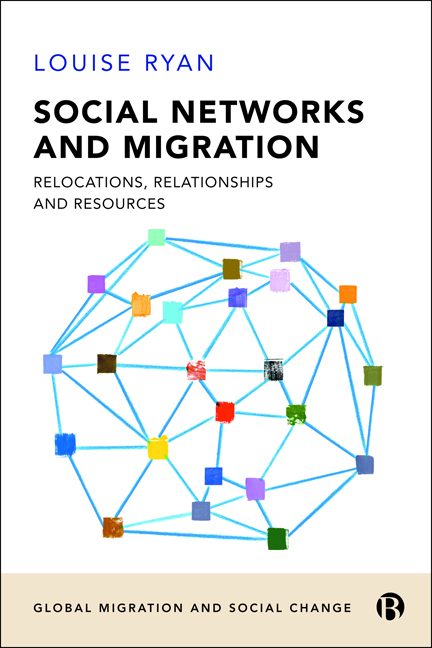Book contents
- Frontmatter
- Contents
- List of Figures
- About the Author
- Acknowledgements
- 1 Introduction: Embarking on a Book about Networks
- 2 Conceptualising Migrant Networks: Advancing the Field of Qualitative Social Network Analysis
- 3 Researching Migration and Networks: Empirical and Methodological Innovations
- 4 Social Networks and Stories of Arrival
- 5 Employment, Deskilling and Reskilling: Revisiting Strong and Weak Ties
- 6 Evolving Networks in Place over Time: A Life Course Lens
- 7 Transnational Ties: Narrating Relationality, Resources and Dynamics over Time
- 8 Conclusion: Thoughts and Future Directions
- Appendix
- Notes
- References
- Index
8 - Conclusion: Thoughts and Future Directions
Published online by Cambridge University Press: 18 January 2024
- Frontmatter
- Contents
- List of Figures
- About the Author
- Acknowledgements
- 1 Introduction: Embarking on a Book about Networks
- 2 Conceptualising Migrant Networks: Advancing the Field of Qualitative Social Network Analysis
- 3 Researching Migration and Networks: Empirical and Methodological Innovations
- 4 Social Networks and Stories of Arrival
- 5 Employment, Deskilling and Reskilling: Revisiting Strong and Weak Ties
- 6 Evolving Networks in Place over Time: A Life Course Lens
- 7 Transnational Ties: Narrating Relationality, Resources and Dynamics over Time
- 8 Conclusion: Thoughts and Future Directions
- Appendix
- Notes
- References
- Index
Summary
Introduction
Migration poses particular opportunities for network researchers. Migration changes social relationships as migrants navigate new ties in new places as well as negotiating existing long-distance ties. However, that is not to suggest migrant exceptionalism (Eve, 2022). While acknowledging the specificities of international migration, I have argued that we can also draw upon the concepts and tools of network researchers who have worked with non-migrants.
This book has sought to contribute to migration studies by applying qualitative SNA to gain nuanced understandings of dynamic relationships, the resources flowing between particular social ties and the relative social location of the actors within specific spatio-temporal contexts. In so doing, I have also sought to advance the field of qualitative SNA by developing my approach of telling network stories.
While presenting the many advantages of this approach, it is important to acknowledge that doing qualitative network analysis and applying the framework of telling network stories is relatively intensive and timeconsuming. It is necessary to invest time in building rapport with participants, especially when seeking to remain in contact with them over a lengthy period of time. Beyond the data generation phase, the analysis of such rich data, especially including visual as well as oral data, can be quite labourintensive. Nonetheless, as I hope to have demonstrated in this book, such an investment of time and effort is undoubtedly worthwhile.
In this concluding chapter, I begin by summarising the contribution of my epistemological, methodological and empirical approaches. I then briefly consider the implications of recent, ‘unsettling events’ (Kilkey and Ryan, 2021), including Brexit, drawing upon follow-up communication with some my participants. Finally, I reflect upon possible future directions for my work and the application of my framework.
The contribution of ‘telling network stories’
Throughout this book, I have argued that migration stories are, at heart, relational stories. People narrate their migration experiences through accounts of dynamic and intricate networks of interpersonal relationships. Network stories are interesting and engaging for readers by presenting particular situations and experiences through vivid and evocative narratives. Moreover, the epistemological and methodological approach of telling network stories, I argue, has the potential to offer new and important insights into how we understand relationality in contexts of migration.
- Type
- Chapter
- Information
- Social Networks and MigrationRelocations, Relationships and Resources, pp. 152 - 165Publisher: Bristol University PressPrint publication year: 2023



